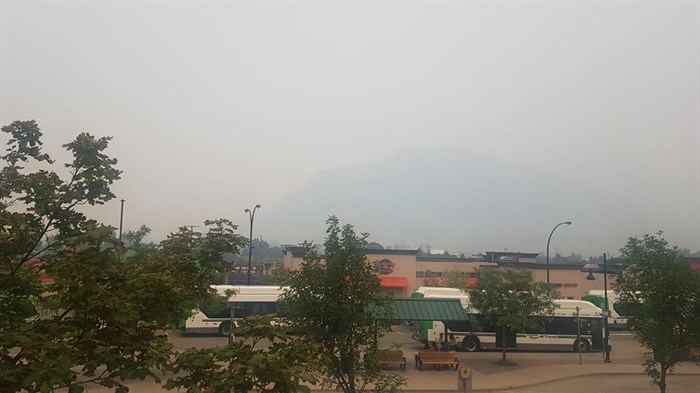
A smoky haze seen in downtown Kamloops, July 1, 2021.
Image Credit: SUBMITTED/Mackenzie Berry
July 01, 2021 - 2:34 PM
Public Health authorities are warning about smoke from multiple wildfires across the province and Kamloops residents are reporting the skies are especially smoky in the city.
Regions including the Thompson-Okanagan will likely be impacted by wildfire smoke over the next 24-48 hours, according to a bulletin from Public Health. Several large wildfires are burning in the region. The largest, at 20,000 hectares, is currently burning 14 kilometres from Kamloops Lake.
A special air quality statement is in place for the North Okanagan, Shuswap, South Thompson, Nicola, Central Okanagan and North Thompson.
Larger fires in the west and northwest of the Interior are generating smoke which will likely make its way into the Thompson-Okanagan region tomorrow through Saturday, said Environment Canada meteorologist Alysa Pederson.
“Of course we can’t speak to any smaller, localized fires. That could reduce air quality in a very local way and in a very intense way,” she said.
Smoke may be seen as far south as Osoyoos this week.
READ MORE: 1,000 people evacuated from Lytton area due to fire, some unaccounted for
During a wildfire, smoke conditions can change quickly over short distances and can vary considerably hour-by-hour.
BreezoMeter, an online tool used to rate air quality, uses a scale from 1-100, with 100 being the best air quality. Kelowna is currently sitting at a 67 out of 100, but Kamloops air quality has deteriorated much further, reporting only a 45 out of 100. The B.C. Air Quality Index also lists Kamloops as currently having a "very high" health risk.
READ MORE: Largest wildfire in province near Kamloops still out of control
People with pre-existing health conditions, respiratory infections such as COVID-19, older adults, pregnant women and infants, children, and sensitive individuals are more likely to experience health effects from smoke exposure, according to Public Health.
During smoky conditions:
• Stop or reduce your activity level if breathing becomes uncomfortable or you feel
unwell.
• Stay cool and drink plenty of fluids.
• If you have asthma or other chronic illness, carry any rescue (fast-acting) medications with you at all times and activate your personal care plan that has been designed with your family physician.
- This story was updated at 4:30 p.m. with a comment from Environment Canada.
To contact a reporter for this story, email Carli Berry or call 250-864-7494 or email the editor. You can also submit photos, videos or news tips to the newsroom and be entered to win a monthly prize draw.
We welcome your comments and opinions on our stories but play nice. We won't censor or delete comments unless they contain off-topic statements or links, unnecessary vulgarity, false facts, spam or obviously fake profiles. If you have any concerns about what you see in comments, email the editor in the link above.
News from © iNFOnews, 2021